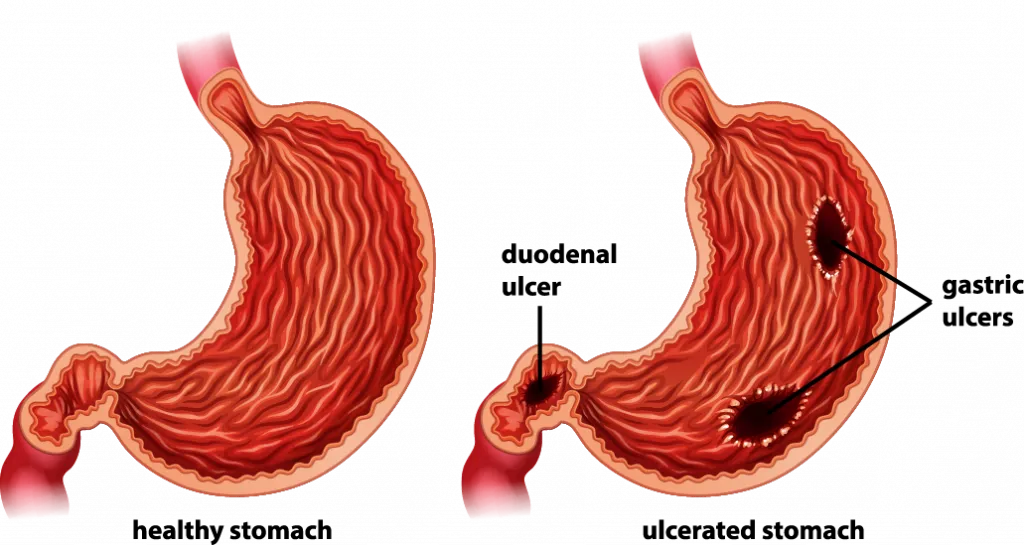General Surgeon | 8 min read
Peptic Ulcer: Symptoms, Complications, Types and Prevention
Medically reviewed by
Table of Content
Key Takeaways
- Peptic ulcers is a common health problem among individuals of various age groups
- The treatment depends on the underlying cause of the peptic ulcers
- If left untreated, the peptic ulcer can cause various complications
Peptic ulcers is a common health problem among individuals of various age groups. Peptic ulcers are sores that develop as a result of inflammation caused by the bacteria H. pylori, as well as from erosion from stomach acids. Frequent use of nonsteroidal anti-inflammatory drugs (NSAIDs) is also proven to cause peptic ulcers
What are Peptic Ulcers?
You may have a peptic ulcer if you have open sores in your stomach or upper small intestine. That occurs when stomach acids remove the mucus lining your digestive tract's protective layer. There can be no symptoms, or there might be discomfort or a sharp ache. Internal bleeding brought on by peptic ulcers might occasionally require blood transfusions in a medical facility.
Peptic ulcers can develop lesions in the lining of the small intestine, lower esophagus, or stomach. They often originate from erosion brought on by stomach acids and inflammation brought on by the H. pylori bacterium. Peptic ulcers are a typical medical condition.
Peptic Ulcer Types
- Gastric ulcer: Develop on the inside of the stomach, on the lining
- Esophageal ulcer: Develop inside the esophagus
- Duodenal ulcer: Develop in the upper section of the small intestines, called the duodenum
Peptic Ulcer Causes
When digestive fluids harm the lining of the stomach or small intestine, ulcers develop. Your gut will feel it if the mucus layer becomes too thin or your stomach produces too much acid. The following are the main reasons:
1. Bacteria
Bacteria. H. pylori, often known as Helicobacter pylori, is a bacterium that up to half of us carry. Most H. pylori patients do not develop ulcers. In others, however, it may increase the acid level and degrade the mucus layer that protects the gut and irritate the digestive system. How the H. pylori virus spreads is a mystery to experts. They speculate that it may spread through intimate contact between individuals, such as a kiss. It can also be acquired by contaminated food and water.
2. Pain Reliefs
Taking certain analgesics may increase the risk. You are more prone to developing a peptic ulcer if you have been using aspirin often and for a long time. Other nonsteroidal anti-inflammatory medications work similarly (NSAIDs). Ibuprofen and naproxen are some of them. NSAIDs prevent your body from producing a substance that aids in preventing stomach acid from penetrating the inner walls of your stomach and small intestine. Peptic ulcers cannot be caused by acetaminophen or other painkillers.
3. Alcohol and Tobacco Consumption
Alcohol use and cigarette smoking can increase your risk of developing ulcers. Physicians have long believed that consuming lots of spicy food and stress does not cause ulcers. However, they could make ulcers worse and more challenging to cure.
The primary cause for peptic ulcers is Helicobacter pylori (H. pylori), a type of bacteria that can cause a stomach infection and inflammation. Peptic Ulcers can also result from:
- The long term use of aspirin and nonsteroidal anti-inflammatory drugs like ibuprofen and naproxen, especially for individuals over the age of 60
- Smoking and drinking too much alcohol renders the esophagus and stomach lining causing frequent peptic ulcers.
- Radiation Therapy
- Stress and spicy foods can worsen the condition, but they don’t cause peptic ulcers

Peptic Ulcer Early Symptoms
- A sharp stomach ache
- Feeling bloated, overstuffed, or belching
- A dislike of fatty meals
- Heartburn
- Nausea
The most common symptom of peptic ulcer illness is a burning stomach ache. Empty stomach and stomach acid both make the pain worse. To ease the agony, consume certain foods that buffer stomach acid or take an acid-reducing medication; the pain may return. The discomfort could be worse at night and between meals.
Many sufferers with peptic ulcers never exhibit symptoms.
Less frequently, severe indications or symptoms like these may be caused by ulcers.
- Vomiting blood that may seem red or black, or vomiting blood
- Having blood in the faeces or having tarry or black stools
- Difficulty breathing
- Feeling weak
- Nausea or diarrhoea
- Sudden weight loss
- Appetite shifts
Peptic Ulcer Symptoms
Burning abdominal pain that radiates from the navel to the chest, which can be minor to severe, is the most typical sign of a peptic ulcer. On occasion, the pain will keep you up at night. However, early or small peptic ulcers may not show any symptoms.
A searing sensation or discomfort will be felt between your breastbone and belly button. You can sense it more when you are not eating, like in the evening or between meals. If you eat or use an antacid, the discomfort could subside momentarily before returning. The discomfort may come and go for several days or even weeks, lasting only a few minutes or hours.
Early Signs Of Peptic Ulcer:
- Bloated sensation
- Burping
- Having no appetite or losing weight
- Nausea
- Dark or bloody faeces
- Vomiting
The most common symptom of peptic ulcer is burning stomach pain.
Other Peptic Ulcer Symptoms Can Include:
- Indigestion
- Nausea
- Feeling of fullness or bloating
- Heartburn
- Fatty food intolerance
- Dark stools, especially with blood
- Pain shortly after eating
- Unexplained weight loss.
Small ulcers could go unnoticed for a while. However, see your doctor if you have any of these symptoms.
Peptic Ulcer Diagnosis
Two different tests may be used to identify peptic ulcers. Upper endoscopy and upper gastrointestinal (GI) series are their names.
Upright Endoscopy
Your doctor will do this operation to check for ulcers by inserting a long tube with a camera down your neck into your stomach and small intestine. Your doctor can also take tissue samples using this tool for analysis.
Not every situation calls for an upper endoscopy. However, those with a higher risk of stomach cancer are advised to have this treatment. People above the age of 45 and those who suffer the following are included in this:
- Anemia
- People who have slimmed down suddenly
- Swallowing challenges
- Stomach bleeding
Upper GI
Your doctor could advise an upper GI test in place of a swallowing test if you don't have any trouble swallowing and have a low risk of stomach cancer. You will consume a thick barium liquid for this operation (barium swallow). Then a technician will X-ray your small intestine, esophagus, and stomach. Your doctor can see the ulcer and cure it thanks to the fluids.
Your doctor will also test to look for H. pylori in your stomach since this infection can lead to peptic ulcers.
Lab Tests:
To check the presence of H.Pylori, samples of blood, urine or breath can be taken.
Endoscopy:
In this, your doctor inserts a long hollow tube with a camera (endoscope) down from your throat into your stomach and small intestine to examine the area for ulcers.
Barium Swallow:
Series of X-rays are taken on swallowing a milky white liquid containing barium that coats the digestive tract to make the ulcers visible.
Peptic Ulcer Treatment
The treatment depends on the underlying cause of the peptic ulcers. Usually, it involves the antibiotics medications to kill the H. Pylori bacterium. It can also include medications that block acid production and promote healing; PPIs that are proton pump inhibitors along with medications that protect the lining of your stomach and small intestine.
The treatment also involves lifestyle modifications like:
- To quit smoking
- To drink less alcohol and caffeine.
- To avoid foods which are spicy and other stimulating items.
- To control stress
- To include a healthy diet and inclusion of probiotics
- To get enough sleep
Peptic Ulcer Prevention
Using the same methods suggested as home remedies for treating ulcers may lower your chance of developing peptic ulcers.
1. Defend Yourself Against Infections
Although the precise method by which H. pylori spreads is uncertain, there is some evidence that it can occur through contact with tainted food or water.
By routinely washing your hands with soap and water and eating thoroughly cooked foods, you may take steps to protect yourself from infections like H. pylori.
2. Be Cautious when Using Painkillers
- If you often use painkillers that increase your risk of peptic ulcers, take steps to reduce your risk of stomach problems. Take your medicine, for example, with a meal.
- Find the lowest dose that will still help you get pain relief by working with your doctor. Avoid consuming alcohol while taking your prescription since the two together might make you more likely to have stomach distress.
- If an NSAID is necessary, you may also need other medications such as antacids, proton pump inhibitors, acid blockers, or cytoprotective medicines. A subclass of NSAIDs known as COX-2 inhibitors may be less likely to induce peptic ulcers but more likely to result in heart attacks.
Peptic Ulcer Risk factors
In addition to the risks associated with using NSAIDs, you may be more likely to develop peptic ulcers if you:
- Smoke: Smoking increases the risk of developing peptic ulcers in people with H. pylori infection
- Drink alcohol: Alcohol increases the amount of stomach acid generated and can irritate and erode the mucus lining of your stomach.
- Possess unresolved tension
- Eat hot food
- These elements do not create ulcers but can exacerbate existing ulcers and make them harder to treat
Peptic Ulcer Complications
If left untreated, peptic ulcers can result in the following:
1. Internal Bleeding
Internal bleeding Anemia can develop gradually from blood loss, or it might happen suddenly and need hospitalization or blood transfusions. Vomit or dark or crimson feces may result from severe blood loss.
2. Perforation
A hole in the stomach's wall. You risk a severe abdominal cavity infection if you have peptic ulcers that perforate your stomach or small intestine (peritonitis).
3. Obstruction
Peptic ulcers can block the passage of food through the digestive tract, causing bloating, nausea, and weight loss due to swelling from inflammation or scarring.
4. Cancers Including Stomach Cancer
Studies have shown a connection between H. pylori infection and a higher risk of stomach cancer.
If left untreated, the peptic ulcer can cause:
- Internal bleeding makes one feel light-headed and dizzy. Black or bloody stools are also a common sign of internal peptic ulcer bleeding
- Infection caused by perforation of the stomach or small intestine results in sudden and extreme abdominal pain.
- Scar tissue that results in blockage of food in the digestive tract ultimately leading to vomiting and sudden weight loss.
Don't take any chances. Consult a specialist from the comfort of your home on Bajaj Finserv Health. Locate a gastroenterologist near you in minutes. View doctors’ years of experience, consulting hours, fees and more before booking scheduling an appointment. Apart from facilitating online appointment booking, Bajaj Finserv Health also offers health plans for your family, medicine reminders, healthcare information and discounts from select hospitals and clinics.
References
Disclaimer
Please note that this article is solely meant for informational purposes and Bajaj Finserv Health Limited (“BFHL”) does not shoulder any responsibility of the views/advice/information expressed/given by the writer/reviewer/originator. This article should not be considered as a substitute for any medical advice, diagnosis or treatment. Always consult with your trusted physician/qualified healthcare professional to evaluate your medical condition. The above article has been reviewed by a qualified doctor and BFHL is not responsible for any damages for any information or services provided by any third party.





